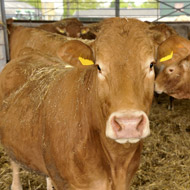
'Negligible risk' status could create new export opportunities
Scotland's rural economy secretary, Fergus Ewing, has unveiled the government's plans to apply for BSE negligible risk status.
The upgrade in status could bring new export opportunities for Scottish producers, Mr Ewing said, as he made the announcement at the Royal Highland Show.
"Our premium produce is world-renowned but there are countries to which we are currently unable to export Scotch Beef and Scotch Lamb," he said.
"Achieving BSE negligible risk status could help open up markets across the world for these premium products, and potentially reduce waste and inefficiencies in the supply chain worth more than a million pounds."
Scotland has been BSE-free since 2009 and has had no cases in animals born since 2005.
Countries or regions are required to adhere to strict requirements before they can apply for the change in status, and at least 11 years must have passed since the birth of an animal with BSE.
Mr Ewing continued: "If Scotland were to successfully apply for and be upgraded to BSE Negligible Risk status, we could be the first region in the world to do so."
The Scottish government will formally consult on its plans this summer.



 The Federation of Independent Veterinary Practices (FIVP) has announced a third season of its podcast, Practice Matters.
The Federation of Independent Veterinary Practices (FIVP) has announced a third season of its podcast, Practice Matters.